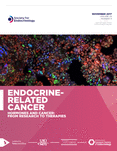Vitamin D and colon cancer
- Instituto de Investigaciones Biomédicas ‘Alberto Sols’, Consejo Superior de Investigaciones Científicas - Universidad Autónoma de Madrid, Arturo Duperier 4, 28029 Madrid, Spain
- (Correspondence should be addressed to A Muñoz; Email: amunoz{at}iib.uam.es)
Abstract
The most active vitamin D metabolite, 1α,25-dihydroxyvitamin D3 (1,25(OH)2D3), is a pleiotropic hormone with wide regulatory actions. Classically, vitamin D deficiency was known to alter calcium and phosphate metabolism and bone biology. In addition, recent epidemiological and experimental studies support the association of vitamin D deficiency with a large variety of human diseases, and particularly with the high risk of colorectal cancer. By regulating the expression of many genes via several mechanisms, 1,25(OH)2D3 induces differentiation, controls the detoxification metabolism and cell phenotype, sensitises cells to apoptosis and inhibits the proliferation of cultured human colon carcinoma cells. Consistently, 1,25(OH)2D3 and several of its analogues decrease intestinal tumourigenesis in animal models. Molecular, genetic and clinical data in humans are scarce but they suggest that vitamin D is protective against colon cancer. Clearly, the available evidence warrants new, well-designed, large-scale trials to clarify the role of vitamin D in the prevention and/or therapy of this important neoplasia.
- Revision received 21 February 2012
- Accepted 27 February 2012
- Made available online as an Accepted Preprint 1 March 2012
- © 2012 Society for Endocrinology












